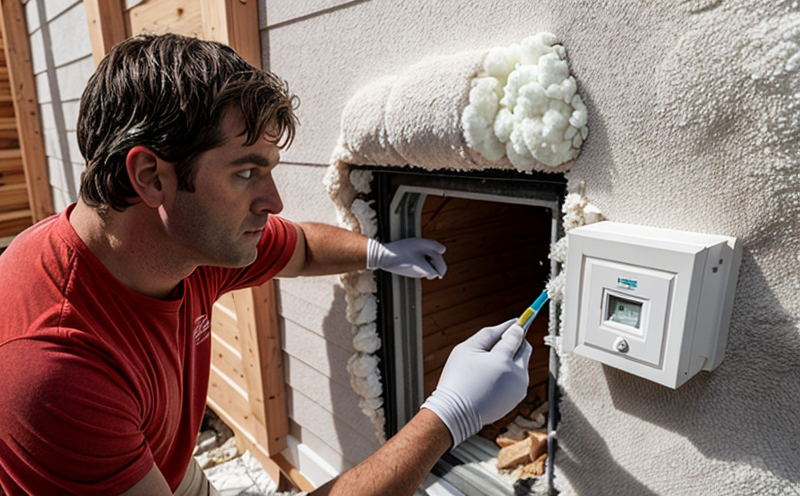ISO 8301 Steady-State Heat Flow Determination
The ISO 8301 standard provides a method to determine the steady-state heat flow through insulation materials under specified conditions. This test is crucial for ensuring that insulating products meet their thermal performance specifications and adhere to regulatory requirements. The method involves measuring the heat flux between two plates, one at a higher temperature than the other, with an insulator sandwiched in between.
The process begins by selecting the appropriate specimen based on its thickness and the expected range of heat flow values. Specimens are typically cut from the material under test to ensure they meet the required dimensions specified in ISO 8301. The specimens must be conditioned at a specific temperature for a defined period before testing to eliminate any moisture content that could affect the results.
During the actual test, the specimen is placed between two plates: one heated and one cooled. A thermocouple measures the temperature difference across the specimen. Heat flows through the insulation from the hot plate to the cold plate, and the heat flow rate (in watts per square meter) is calculated using the formula:
\[ q = k \cdot A \cdot \frac{\Delta T}{d} \] where \(q\) is the heat flux, \(k\) is thermal conductivity, \(A\) is the surface area of the specimen, \(\Delta T\) is the temperature difference across the specimen, and \(d\) is the thickness. ISO 8301 specifies the conditions under which this calculation should be made.The test setup must be carefully controlled to ensure accurate results. The apparatus used for testing includes a heat flow meter capable of measuring both the temperature gradient through the insulating material and the heat flux. This equipment is typically calibrated according to ISO 5667-1, which ensures that it meets international standards.
The test results are critical in quality control processes as they provide data on how effectively an insulation product can maintain its thermal performance over time. These tests help manufacturers and installers ensure compliance with building codes and energy efficiency regulations such as ASHRAE or the European Union's Ecodesign Directive for Energy-Using Products.
For instance, in a residential setting, if the insulation installed does not meet the required thermal resistance (R-value), it could lead to increased heating costs due to more heat loss through the walls. In commercial buildings, such as hospitals or office complexes, non-compliant insulation can result in significant energy wastage and higher operational expenses.
The ISO 8301 standard also plays an important role in research and development (R&D) efforts aimed at improving the performance of insulating materials. Engineers use this test to develop new formulations that enhance thermal resistance without sacrificing other desirable properties like strength or flexibility. By iterating on these tests, manufacturers can create products that not only meet current standards but are also prepared for future regulatory changes.
In conclusion, the ISO 8301 steady-state heat flow determination is a fundamental tool in the evaluation of insulation materials' thermal performance. It provides essential data to ensure compliance with various standards and regulations while supporting ongoing efforts to improve material efficiency.
Eurolab Advantages
EuroLab stands out as a premier provider of ISO 8301 testing for insulation materials. Our team of experts ensures that each test is conducted according to the latest standards, providing accurate and reliable results every time.
We offer state-of-the-art equipment calibrated to international specifications, ensuring consistent and precise measurements. Our facilities are equipped with high-quality heat flow meters designed specifically for this type of testing, allowing us to provide detailed insights into a wide range of insulating materials.
Our experienced staff includes professionals who have extensive experience in the field of thermal performance testing. They understand the nuances of each material and can offer valuable advice on how best to achieve optimal results during testing. Additionally, our comprehensive reporting service ensures that clients receive clear documentation of all test procedures and findings, facilitating easier compliance with regulatory requirements.
Moreover, EuroLab offers customized solutions tailored to meet individual client needs. Whether you require additional support in selecting the correct specimens or need assistance interpreting complex data sets, we have the expertise to deliver effective solutions.
Why Choose This Test
The ISO 8301 steady-state heat flow determination is essential for several reasons. Firstly, it helps manufacturers ensure that their products meet strict quality control standards before they reach the market. By identifying any discrepancies early in the production process, companies can reduce waste and improve overall product reliability.
Secondly, this test provides valuable information to architects and engineers during the design phase of new construction projects. Accurate thermal performance data allows them to select appropriate materials that will contribute positively to the building's energy efficiency goals. This not only reduces operational costs but also contributes towards sustainable development initiatives.
For existing buildings undergoing renovation or retrofitting, understanding the current state of insulation is crucial for determining necessary improvements. The ISO 8301 test can help identify areas where additional insulation might be beneficial, leading to enhanced occupant comfort and lower utility bills.
In addition, compliance with relevant regulations ensures that products do not pose health risks associated with poor thermal performance. For example, insufficient insulation can lead to mold growth or condensation issues within walls, which could affect indoor air quality significantly.
Competitive Advantage and Market Impact
Adopting ISO 8301 testing offers significant competitive advantages in the building and infrastructure sectors. It demonstrates a commitment to excellence, enhancing brand reputation among clients seeking high-quality materials.
By consistently meeting or exceeding industry benchmarks, companies can differentiate themselves from competitors who may not adhere strictly to these standards. This translates into increased customer satisfaction and loyalty, ultimately boosting sales performance.
In the broader market context, adherence to ISO 8301 helps promote fair competition by setting a clear framework for evaluating insulation products based on objective criteria rather than subjective opinions or personal preferences.





